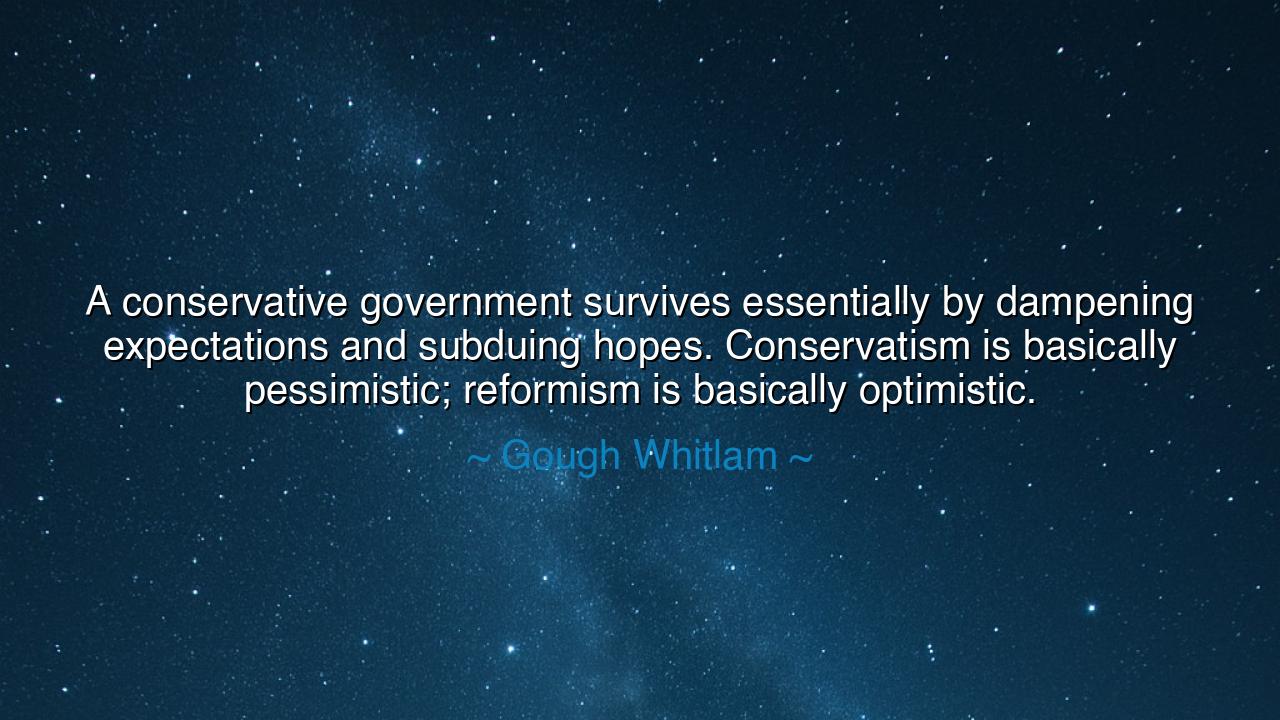
A conservative government survives essentially by dampening
A conservative government survives essentially by dampening expectations and subduing hopes. Conservatism is basically pessimistic; reformism is basically optimistic.






"A conservative government survives essentially by dampening expectations and subduing hopes. Conservatism is basically pessimistic; reformism is basically optimistic." — Gough Whitlam
Hear now, O seekers of truth and justice, the words of Gough Whitlam, a leader of vision who dared to challenge the ancient chains of complacency. His voice rose in the age of modern Australia, yet his message carries the eternal rhythm of every era in which the human spirit has wrestled between the safety of the old and the promise of the new. When he declared that “a conservative government survives essentially by dampening expectations and subduing hopes,” he spoke of a timeless struggle — the struggle between fear and faith, between those who cling to what is and those who dream of what might be.
In Whitlam’s eyes, conservatism was not merely a political stance but a temperament of the spirit — a way of governing through caution, through the quiet art of restraint. It survives, he said, by lowering the horizons of the people, by teaching them to expect little and to hope less. It whispers that change is dangerous, that dreams are costly, that progress is disorder. Thus, it governs not by inspiring, but by soothing, by convincing the weary that contentment is virtue and that aspiration is folly. It thrives on pessimism, for to believe that mankind cannot improve is to justify inaction.
By contrast, reformism — the vision that Whitlam championed — is optimistic, not because it ignores hardship, but because it refuses to bow before it. Reformism looks upon the broken world and says, “This can be mended.” It believes that the arc of history is not fixed, that justice can be widened, that ignorance can be dispelled, that poverty can be defeated. To the reformer, hope is not naïveté but strength; to hope is to act. Whitlam’s own government, though short-lived, was a testament to this fire — it brought education to the poor, healthcare to the vulnerable, and opportunity to those who had long stood outside the gates of privilege. His optimism was not born of comfort, but of conviction.
To see the truth of his words, look across the ages. In the Victorian era, when the steam and smoke of industry choked both sky and soul, the wealthy clung to their order, warning that to empower the poor would bring chaos. Yet reformers like William Wilberforce and Florence Nightingale rose against that tide. They refused the easy comfort of resignation. Wilberforce fought to end the slave trade, and Nightingale reformed the cruelty of medicine — not because they were blind to reality, but because they believed humanity was capable of better. In their optimism lay the seed of progress. Conservatism would have preserved the chains; reformism broke them.
Whitlam’s words also speak to the nature of the human heart. There is, within each of us, a conservative and a reformer. The conservative whispers, “Be still; the world is too vast to change.” The reformer answers, “Even so, let us try.” The conservative clings to stability; the reformer yearns for renewal. Yet Whitlam warns that when government itself becomes the instrument of fear, when it rules by curbing desire rather than by igniting purpose, it betrays the very people it was made to serve. For a government without hope breeds citizens without faith, and a nation without faith drifts into decline.
His statement, then, is not a condemnation of prudence, but a call to courage. There are times when caution preserves, but there are also times when it imprisons. A people who are forever told that they cannot, eventually forget that they can. Whitlam reminds us that progress demands a measure of defiance — the willingness to dream beyond what is convenient. For when rulers seek only to dampen expectations, they do not protect the people; they silence them. True leadership does not subdue hope; it cultivates it.
So, my children of the future, take this wisdom as both warning and blessing. Beware the voice that tells you to settle for less. Do not mistake safety for freedom, nor quiet for peace. The world you inherit is not meant to be preserved like a relic, but to be shaped like clay. Question the powers that rule by fear; honor those who lead by faith. Be not afraid to hope greatly, to expect boldly, to reform courageously. For as Whitlam taught, pessimism builds walls — but optimism builds worlds. And it is always the builders of worlds, not the keepers of walls, who carve their names into the heart of history.






AAdministratorAdministrator
Welcome, honored guests. Please leave a comment, we will respond soon